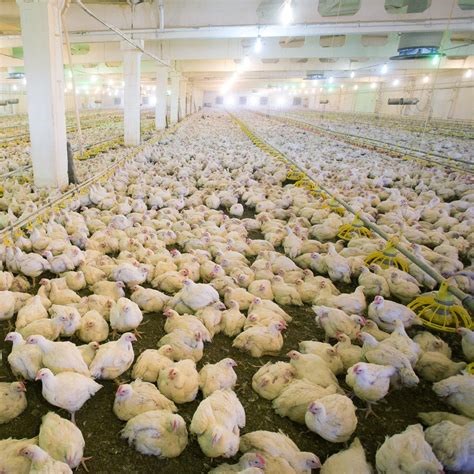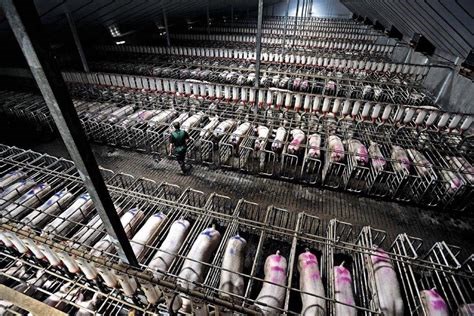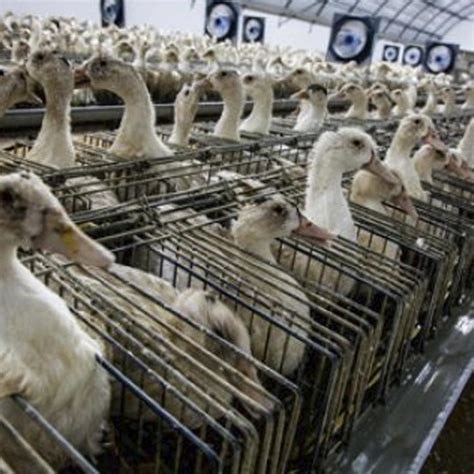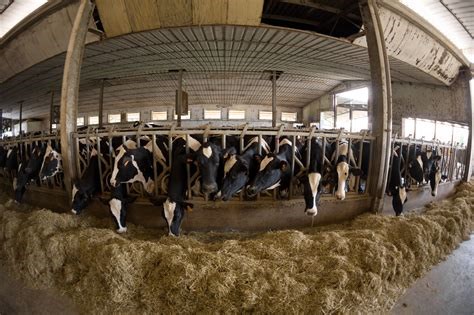Discover the harsh reality of factory farming and its impact on animals. A Closer Look at Animals on Factory Farms sheds light on this inhumane industry.
Have you ever stopped to consider where your food comes from? Specifically, the meat on your plate. While it’s easy to pick up a package of chicken breasts or ground beef at the grocery store, the reality is that most of the meat we consume comes from factory farms. These massive operations are designed to produce as much meat as possible, as quickly and cheaply as possible. But at what cost? A closer look at animals on factory farms reveals a dark side to our food production system.
First and foremost, let’s talk about the living conditions of these animals. They are often confined to tiny cages or pens, with no space to move around or even turn around. Many never see the light of day, and are kept in cramped and filthy conditions. They are fed a steady diet of antibiotics and hormones to keep them alive and growing, but this also means that the meat we consume is often filled with these substances.
But it’s not just the living conditions that are cause for concern. The way these animals are treated is often inhumane and cruel. They are subjected to painful procedures like tail docking and castration without any anesthesia. And when it’s time for slaughter, they are often killed in ways that are painful and terrifying.
As consumers, we have a responsibility to know where our food comes from and what kind of conditions the animals were raised in. A closer look at animals on factory farms may be difficult, but it’s important if we want to make informed choices about the foods we eat.




When we think of farms, we often picture happy animals roaming around in open fields. However, the reality is far from this idyllic image. Factory farms are notorious for their shocking conditions, where animals are kept in cramped spaces with little access to sunlight, fresh air, or even adequate food and water.
These conditions not only take a toll on the physical health of the animals, but also their psychological well-being. Being confined to small spaces and living in constant fear of abuse and neglect can cause extreme stress and anxiety in animals. This, in turn, can lead to aggressive behavior and other mental health issues.
The health hazards posed by factory farms are also a major concern. Animals living in such tight quarters are more susceptible to diseases and infections, which can spread rapidly throughout the entire facility. The overuse of antibiotics in these farms has also led to the rise of antibiotic-resistant bacteria, which pose a serious threat to human health as well.
Industrial agriculture is also taking a significant toll on the environment. The large amounts of waste produced by factory farms are often improperly disposed of, leading to water and air pollution. The use of pesticides and fertilizers further contributes to environmental degradation, affecting both wildlife and human populations.
Perhaps the most disturbing aspect of animal agriculture is the cruelty and abuse that takes place behind closed doors. Undercover investigations have revealed the horrific treatment of animals, including beating, kicking, and even torturing them. The sad truth is that animals raised for food are viewed as commodities rather than living beings, and their welfare is often disregarded in favor of profit.
Despite the false image portrayed by the industry, the reality is that most farm animals never experience true happiness. Claims of free-range or humane farming practices are often misleading, with animals still being subjected to overcrowding and neglect.
The scandalous treatment of female livestock is another issue that should not be overlooked. Female animals are often forced to give birth repeatedly, with little time to recover in between. They are also subjected to invasive breeding techniques and painful mutilations, such as tail docking and debeaking.
There are also many misconceptions about animal diets and nutrition. For example, the belief that cows need to consume large amounts of grain to produce milk is simply untrue. In reality, cows can thrive on a diet of grass and other forage, which is much healthier for both the animal and the consumer.
The economic implications of factory farming cannot be ignored either. While it may seem like a cost-effective way to produce food, the long-term consequences of industrial agriculture are staggering. The environmental and health costs alone are significant, not to mention the ethical concerns surrounding the treatment of animals.
Ultimately, the ethical dilemma of eating meat from factory farms is one that each individual must grapple with. While it may be difficult to give up meat entirely, there are ways to make more informed and conscious choices about where our food comes from. Supporting local farmers who practice sustainable and humane farming practices is one option, as is reducing our overall consumption of animal products.
When we take a closer look at the realities of animal agriculture, it becomes clear that the current system is not sustainable or ethical. It is up to us to demand change and work towards a more compassionate and responsible food system for all.
Once upon a time, there were animals living on factory farms that were hidden away from the public eye. These animals lived in cramped and unsanitary conditions, where they were treated as commodities rather than living beings. But one day, a group of brave individuals decided to take a closer look at these animals and expose the truth about their lives on factory farms.
Point of View: A Closer Look At Animals On Factory Farms
- It is important to recognize that animals on factory farms are sentient beings who experience pain, fear, and suffering just like humans do.
- The conditions in which these animals are kept are often inhumane, with little to no access to natural light, fresh air, or space to move around.
- The use of antibiotics and hormones on factory farms can have negative effects on both animal and human health.
- Factory farming practices contribute to environmental degradation and climate change.
- Consumers have the power to make a difference by choosing to support more humane and sustainable farming practices.
By taking a closer look at animals on factory farms, we can begin to understand the impact of our choices and work towards a more compassionate and sustainable future for all living beings.
Thank you for taking the time to read this article on A Closer Look At Animals On Factory Farms. It is important to understand the impact that these farms have on our environment, economy, and most importantly, the welfare of animals. Through this article, we hoped to provide a detailed insight into how animals are treated in these farms, the conditions they live in, and the ethical concerns that arise from their treatment.
As mentioned in the article, factory farming has become the norm in modern agriculture. However, it is important to consider the impact it has on the welfare of animals, the environment, and our food supply. The practices used in factory farms can lead to harmful effects on the animals, such as stress, disease, and even death. These practices also contribute to environmental problems such as water pollution and land degradation.
It is important to be aware of the conditions in which our food is produced and to make informed decisions about the products we consume. By supporting local farms that use sustainable and ethical practices, we can help promote the welfare of animals and support environmentally conscious agriculture. We hope this article has provided insight into the importance of understanding the impact of factory farming and encourages readers to take action by making informed choices.
We encourage you to share this article with others, continue the conversation, and do your part in supporting ethical and sustainable agriculture. Let’s work together to create a better future for the animals, the environment, and ourselves.
.
People also ask many questions about A Closer Look at Animals on Factory Farms. Here are some of the most common questions and the answers to them:
-
What is a factory farm?
A factory farm is an industrial facility where large numbers of animals, such as chickens, cows, and pigs, are raised for food production. These facilities are designed to maximize efficiency and profits, often at the expense of animal welfare and environmental sustainability.
-
How are animals treated on factory farms?
Animals on factory farms are typically kept in overcrowded and unsanitary conditions, with little or no access to fresh air, sunlight, or outdoor space. They may be subjected to painful procedures like debeaking, tail docking, or castration without anesthesia. Many animals suffer from stress, disease, and injury as a result of these conditions.
-
Why are factory farms bad for the environment?
Factory farms generate massive amounts of animal waste, which can pollute nearby water sources and contribute to climate change. They also require large amounts of resources like feed, water, and energy, which can strain local ecosystems and contribute to deforestation, water scarcity, and other environmental issues.
-
Are there alternatives to factory farming?
Yes, there are many alternative models of animal agriculture that prioritize animal welfare, environmental sustainability, and public health. Some examples include pastured livestock, free-range poultry, and regenerative agriculture.
-
What can I do to support more humane and sustainable farming practices?
You can support local farmers who use sustainable and humane practices, advocate for better animal welfare and environmental regulations, reduce your consumption of animal products, and educate others about the importance of ethical and sustainable farming practices.






